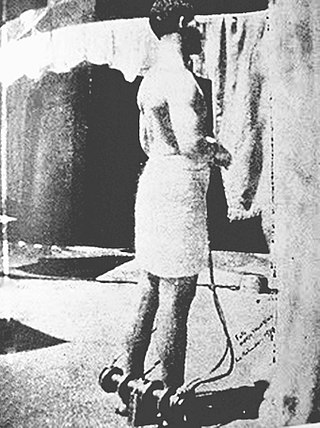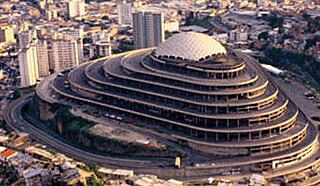Related Research Articles
Adolfo Marsillach Soriano was a Spanish actor, playwright and theatre director. He was born in Barcelona.

Ana Álvarez Wagener is a Spanish actress. She has appeared in such films as The Sleeping Voice, My Prison Yard, Biutiful, and The Invisible Guest. Her television credits include the role of Vicenta Ramírez in La Señora and its successor 14 de abril. La República.
Basque National Liberation Movement prisoners are all those people who have been imprisoned, placed on remand, or otherwise kept in custody due to their illegal activity in support of the Basque National Liberation Movement.

Foro Penal is a Venezuelan human rights organization that provides legal assistance pro bono to people subject of arbitrary detentions and their relatives. The organization is composed of regional coordinators for each state in Venezuela, pro bono lawyers on a national level and a network of over five thousand volunteers, non-lawyer activists, known as "active defensors".

Throughout its history, many people have been arrested and imprisoned in Venezuela for political reasons, mainly during the dictatorship of Juan Vicente Gómez and that of Marcos Pérez Jiménez in the 20th century and during the Bolivarian Revolution in the 21st century.

Fernando Grande-Marlaska Gómez is a Spanish judge and politician who has served as minister of the Interior since June 2018. An independent politician close to the Spanish Socialist Workers' Party, he has been Member of the Congress of Deputies from 2019 to 2020, and during 2023, representing Cádiz.

Torture in Venezuela has been a consistent phenomenon throughout its history. Various dictatorships from the Spanish colonial era into the twentieth century utilized torture against common criminals and political opponents. Dissidents and lower class citizens were targets of torture during the administration of Carlos Andrés Pérez in the late-twentieth century. Into the twenty-first century during the crisis in Venezuela, the United Nations, Organization of American States, Amnesty International, Human Rights Watch and Foro Penal documented acts of torture and violence towards real or perceived opponents of the Bolivarian government, mainly detainees, including by state institutions such as the Bolivarian National Intelligence Service (SEBIN).

The 2018 Nicaraguan protests began on 18 April 2018 when demonstrators in several cities of Nicaragua began protests against the social security reforms decreed by President Daniel Ortega that increased taxes and decreased benefits. After five days of unrest in which nearly thirty people were killed, Ortega announced the cancellation of the reforms; however, the opposition has grown through the 2014–2018 Nicaraguan protests to denounce Ortega and demand his resignation, becoming one of the largest protests in his government's history and the deadliest civil conflict since the end of the Nicaraguan Revolution. On 29 September 2018, political demonstrations were declared illegal by President Ortega.

A group of inmates were involved in a prison riot on 24 May 2019 in the police station cellblocks in Acarigua, Portuguesa state, Venezuela. The riot allegedly began when inmate Wilfredo Ramos was killed following ten days of protests against the denial of visits by relatives.

Ester Expósito Gayoso is a Spanish actress and model. She is best known for her starring role as Carla Rosón Caleruega in the Netflix teen drama series Élite.

The Guanare prison riot, also known as the Guanaremassacre, occurred in the Los Llanos prison in Guanare, Portuguesa state, Venezuela, on 1 May 2020. The events caused around 47 deaths, and 75 people were injured.

Ángela Cremonte is a Spanish-Argentine actress. She is best known for her performance playing Elisa in Cable Girls.
Fabián Urbina was a Venezuelan protester killed during the 2017 Venezuelan protests.
This is a list of Spanish television related events in 1989.
This is a list of Spanish television related events in 1998.

Arturo McFields Yescas is a Nicaraguan journalist and diplomat. After denouncing Daniel Ortega, he revealed that he was classified as a "traitor to the country" by the Sandinista government.
References
- ↑ Istanbul Protocol: Manual on the Effective Investigation and Documentation of Torture and Other Cruel, Inhuman or Degrading Treatment or Punishment (PDF) (Professional Training Series No. 8/Rev.1 ed.). New York and Geneva: United Nations. 2004. pp. 29–38. Retrieved 28 October 2016.
- ↑ G. R. Scott, A History of Torture (London: Merchant, 1996).
- ↑ Caroli, Paolo (2014). "The Role of the Judiciary Within the Construction of Collective Memory. The Italian Transition". Wroclaw Review of Law, Administration & Economics. 5:1: 169. Retrieved 28 October 2016.
- ↑ Mozo Zambrano, Reynaldo (2022-10-09). "Ángela Expósito, sometida a torturas de la edad media #PresasPolíticas". Efecto Cocuyo (in Spanish). Retrieved 2024-02-18.
Le arrancaron de raíz unas uñas con una tenaza, dormía en un colchón sucio y lleno de sangre, hacia sus necesidades en un pote plástico, siempre en un cuarto pequeño muy frío y con la luz encendida noche tras noche.
- ↑ Conclusiones detalladas de la Misión internacional independiente de determinación de los hechos sobre la República Bolivariana de Venezuela (PDF) (in Spanish). Independent International Fact-Finding Mission on Venezuela. 16 September 2021. pp. 144, 146.
- ↑ "Estudiantes de la ULA fueron agredidas por chavistas: les arrancaron uñas de las manos". Monitoreamos (in Spanish). 2022-11-03. Retrieved 2022-11-06.
- ↑ Miranda, Carlos Salinas Maldonado, Lorena Arroyo, Wilfredo (2021-07-20). "Exilio, miedo, cárcel y muerte: el coste de la resistencia en Nicaragua". El País (in Spanish). Retrieved 2022-02-26.
{{cite web}}: CS1 maint: multiple names: authors list (link) - ↑ "El Chipote, la cárcel de los horrores sandinistas". El Mundo (in Spanish). 2021-07-02. Retrieved 2022-02-26.
- ↑ Medina Sánchez, Fabián (2 January 2022). "Los 38 métodos de tortura que utiliza el régimen de Daniel Ortega contra los presos políticos". infobae (in Spanish). Retrieved 2022-02-26.
- ↑ "Noches de interrogatorios y torturas en El Chipote". 4to Mono (in Spanish). 2019-03-30. Retrieved 2022-02-26.